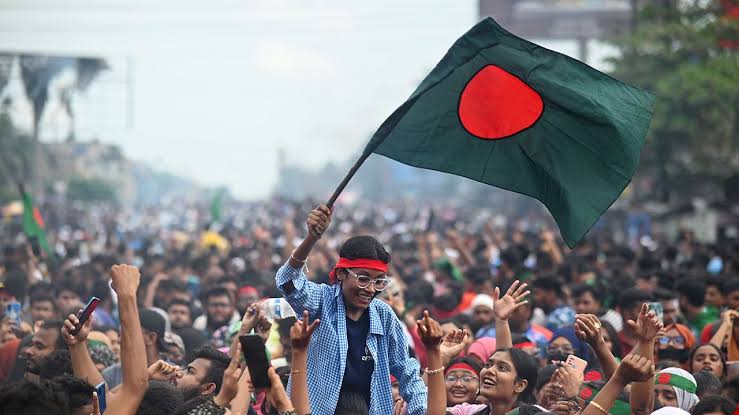Fate of Bangladesh’s democracy and sovereignty will be sealed on June 13

By Salah Uddin Shoaib Choudhury
Following the May 21, 2025 meeting between Muhammad Yunus and General Waker Uz Zaman, Chief of the Bangladesh Army, where the latter set several strict preconditions – such as holding the national election by December 30 this year, refraining from leasing Chittagong Port to any foreign entity, avoiding granting corridor facilities to Myanmar’s Arakan State, and not taking any major policy decisions before a duly elected government assumes office in January 2026 – the situation in Bangladesh is becoming increasingly uncertain.
Yunus, however, appears to have no intention of holding the election within the stipulated timeframe. Instead, he seems determined to delay the electoral process indefinitely under various pretexts.
Yunus and his inner circle – which includes so-called “student coordinators” as well as radical Islamic factions such as Jamaat-e-Islami, Hefazat-e-Islam, Hizbut-Tahrir, and Ansar al-Islam (the local affiliate of AlQaeda), in addition to influential external players like the US Deep State and Pakistan’s Inter-Services Intelligence (ISI) – are vehemently opposed to holding elections.
Their reluctance stems from the strong likelihood that power would then pass to an elected government – most probably the Bangladesh Nationalist Party (BNP) – which would spell an end to their ambitions of retaining power indefinitely at the cost of Bangladesh’s sovereignty – by whatever means necessary.
Yunus’s cohorts are also advancing a sinister plan to nullify the Constitution of Bangladesh by issuing a declaration titled the “July Charter”. This move, if realized, would transform the current regime into a so-called “Revolutionary Government”, granting Muhammad Yunus unchecked authority.
It would allow him to dismiss President Shahabuddin Ahmed Chuppu and Army Chief General WakerUz Zaman, thereby paving the way for Bangladesh’s transformation into a brutal dictatorship – possibly under the banner of an “Islamic Republic” or “Bengal Caliphate” – with full backing from the US Deep State, Pakistani ISI, and Islamist allies like Turkey.
Less than three weeks after the meeting with General WakerUz Zaman, Yunus delivered a televised address to the nation in which he categorically stated his intention to hold the election in April 2026 – not December 2025, as suggested by the army chief.
He also called upon the people to “resist” any attempt by the opposition to lease Chittagong Port to DP World – a company allegedly controlled by the US Deep State. Moreover, Yunus reiterated his firm resolve to issue the “July Proclamation”, which, according to media reports, is scheduled for announcement no later than the second week of July.
This open defiance of General WakerUz Zaman’s suggestions demonstrates Yunus’s growing authoritarian tendencies and hints at a belief that he is no longer accountable to the very forces that brought him to power. It is worth recalling that Yunus was brought back from France in August 2024 by General Waker and installed as Chief Advisor.
The reasons for Yunus’s hardened stance appear to be twofold: either he fears that relinquishing power would expose him to investigations into financial irregularities and potential crimes committed over the past ten months, or he perceives himself to be more powerful than General WakerUz Zaman, the entire armed forces, and even the people of Bangladesh.
Since assuming office on August 8, 2024, Yunus has undertaken several actions that are viewed as hostile toward the military establishment. He has accused previous Director Generals and Directors of the counterterrorism bureau within the Directorate General of Forces Intelligence (DGFI) of crimes against humanity and placed an unknown number of military officers under house arrest, for their “crimes” of playing crucial role in fighting terrorism and militancy.
Surprisingly, none of these actions provoked any visible objection from General WakerUz Zaman, causing concern within the armed forces. Many officers and soldiers now feel they are being held hostage by Yunus and his foreign backers. This environment of distrust has enabled Pakistan’s ISI to strengthen its influence within the ranks of the Bangladesh military.
In a particularly provocative move, Yunus appointed an alleged American national as the country’s National Security Advisor (NSA), giving him access to all classified information. This individual, Khalilur Rahman, is widely believed to be backed by the US Deep State and to maintain close ties with the Pakistani military and ISI.
Although media reports indicate that both General WakerUz Zaman and the BNP demanded Khalilur Rahman’s immediate removal, Yunus has shown no intention of complying with that demand.
Currently, Yunus is visiting the United Kingdom to receive the ‘Harmony Award’ from King Charles III, a monarch embroiled in multiple controversies. While there, Yunus sought a meeting with British Prime Minister Keir Starmer, which was ultimately declined.
However, the most significant event of his trip is the scheduled June 13 meeting with Tarique Rahman, Acting Chairman of the BNP. Yunus is expected to persuade Tarique to accept a delayed election timeline, agree to lease Chittagong Port to DP World, endorse the upcoming “July Charter”, and support deepening ties with anti-India geopolitical blocs.
It should be noted that Yunus has already spent billions of takas on his 11 foreign trips in the past ten months – trips that have largely served to promote his personal image without yielding tangible benefits for the nation. His upcoming meeting with Tarique Rahman is critical; if he fails to secure Tarique’s cooperation, particularly on sensitive issues such as the election timeline, the Arakan corridor, and strategic access to locations like St. Martin’s Island and Lalmonirhat Airbase, Yunus may find himself out of viable options.
According to political analysts, Yunus’s motivation for accepting the ‘Harmony Award’ from King Charles III is to dominate domestic headlines and project an image of legitimacy as the de facto head of state – not as a transitional figure, but as a permanent one.
For this to succeed, he must gain support from BNP leader Tarique Rahman, currently one of the most influential political figures in Bangladesh. With the Awami League virtually disbanded following the August 2024 crackdown and its leader Sheikh Hasina in exile in India, the BNP stands as the only viable political force capable of challenging Yunus.
Should Tarique Rahman reject Yunus’s proposals on June 13, the implications could be enormous. Not only could Yunus lose the support of the US Deep State – which may begin viewing him as a liability or a “dead horse” – but he may also face increasing resistance from within Bangladesh’s military establishment.
A failure to return from the UK with Tarique’s endorsement would likely reignite tensions between Yunus and the armed forces, particularly given General WakerUz Zaman’s earlier insistence on timely elections and the preservation of national assets.
In such a scenario, BNP and Tarique Rahman are expected to lend full support to General WakerUz Zaman, pushing Yunus into a politically perilous situation.
According to a recent revelation by senior journalist and television anchor Zillur Rahman, several of Yunus’s close aides and advisors are already exploring options for fleeing the country and seeking asylum abroad. Zillur Rahman, known to be a long-time supporter of Yunus, dropping such a bombshell has sparked widespread speculation that the end of the Yunus regime may be imminent.
If Yunus is unable to hold on to power, his downfall may happen abruptly. This would likely result in the formation of a new caretaker government led by a neutral Chief Executive appointed by President Shahabuddin Ahmed Chuppu. This caretaker administration would be tasked with organizing national elections within a specific timeframe. In this process, the Bangladesh Armed Forces, under the leadership of General WakerUz Zaman, are expected to extend their full cooperation to restore democratic governance and national stability.
The June 13 meeting between Muhammad Yunus and Tarique Rahman is not just a political rendezvous – it is a defining moment that will determine whether Bangladesh marches toward democratic restoration or descends into authoritarian darkness. If Yunus fails to co-opt the BNP into his grand design of delayed elections, foreign servitude, and constitutional subversion, his regime will rapidly unravel.
The fate of the nation now rests on whether its people, political forces, and the armed forces can rise together to resist a creeping dictatorship orchestrated by foreign patrons and local conspirators. Bangladesh stands at a perilous crossroads – either reclaim its sovereignty or surrender to the ambitions of a self-declared ‘Sultan’ and his shadowy international masters. Time is running out. The battle for Bangladesh’s soul begins now.




